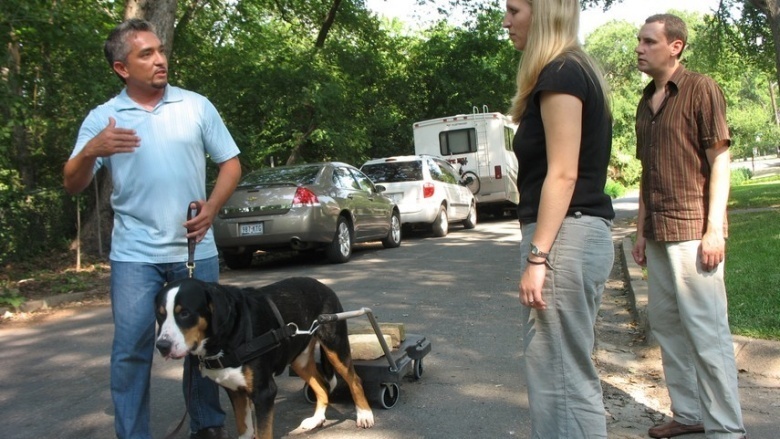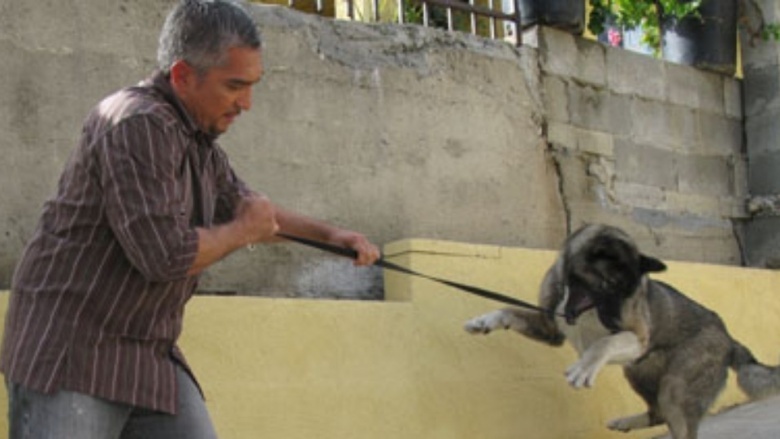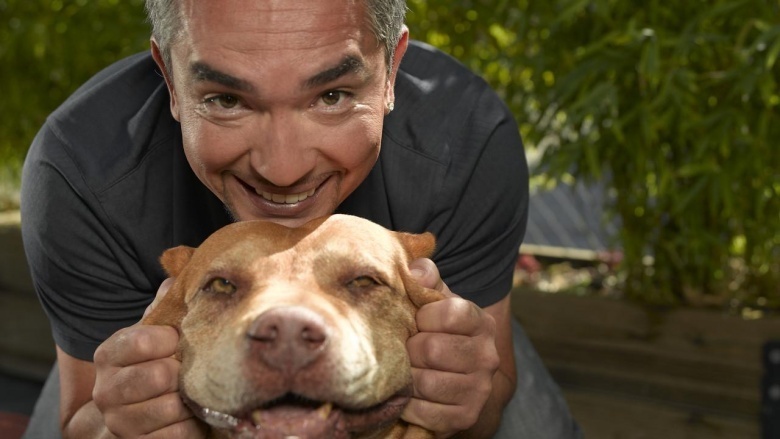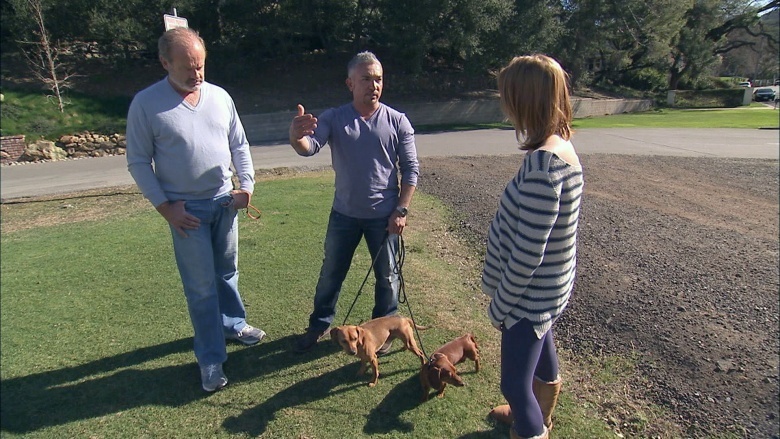Reasons Why You Should Never Listen To The Dog Whisperer
The Dog Whisperer with Cesar Millan, where Millan "rehabilitated dogs, but trained people," had a tremendous viewership while on the air, reaching 11 million US viewers every week. Many celebrities contacted Cesar to work with their dogs, and Millan even became caretaker of Daddy, rapper Redman's American Pit Bull Terrier, aka The Most Perfect Dog Ever. Daddy's temperament was one of Millan's key tools for convincing the public that all dogs were capable of impeccable behavior. Of course, that isn't true so, despite the show's popularity, that's one reason (among others) you shouldn't listen to the Dog Whisperer.
Even National Geographic warns you
Want to whisper like Cesar? Too bad — apparently, Cesar Millan is the only person who can safely use his own methods. At least, that's what the lawyers for the network likely said when they inserted a disclaimer at the start of every episode warns, "do not attempt these techniques yourself without consulting a professional." So, unless you can actually get Cesar out to your house to work with your dogs, don't even bother, as his methods are too dangerous to attempt yourself.
So, instead of Millan's show being somewhat instructional, it was just reality TV. After all, the network deals with reality TV stunts the same way. Just think of these dog behavior tips as fishing expeditions on Fish Warrior, or public safety tips from Alaska State Troopers. In other words, these tips are from the pros. Don't try this at home, because your reality is not theirs.
Really, nobody can do what Cesar can do
Cesar, by his own admission, has a natural way with dogs, and has since he was a kid. On his biography page, he says that dogs on his grandfather's farm following him everywhere caused a bit of bullying. The children would call him el perrero, or "the dirty dog boy," which somehow inspired him to work hard to become the best dog trainer ever. El gran perrero, if you will.
Many of his critics admit that he has a particular talent for communicating with dogs and yet, despite all this inborn talent, Millan received no formal training. His methods are his own, developed over his many years of living around canines. Yet, the Bergin University of Canine Studies still actually awarded Millan with an honorary master's degree, much to the dismay of Marc Bekoff, Ph.D., who resigned from the university upon learning this news. Some students asked for their money back, and many of the school's faculty members spoke out against the degree.
Incidentally, the only country that requires someone to pass an exam before becoming a dog trainer is Germany. To prove himself to the public, Millan took the exam. And failed. That's not to say that Cesar isn't good with dogs. He totally is. His methods just aren't the traditional, scientifically accepted ways of changing dog behavior. Which brings us to ...
The fundamental idea behind his methods could be faulty
The foundation of the Dog Whisperer's training philosophy is based on the idea that, in order to adjust your dog's behavior, you have to understand the "pack" mentality. You see, according to Cesar, since all dogs are descended from wolves, and wolves exist in packs with "alphas," in order to exert positive dominance over your dog, you have to be the "pack leader," or "alpha."
Thing is, that's not exactly true. The part about wolves, at least. Rudolph Schenkel observed wolves in a zoo environment, and actually observed the alpha wolf phenomenon. However, famous wolf researcher David Mech studied wolves in the wild and argues that they don't behave at all like wolves in captivity. In Mech's research, wild wolves actually have a family structure, rather than an alpha-led structure. The mated pair, and their cubs, are the pack, and there quite simply is no alpha.
Cesar might counter that dogs who live in homes with other dogs adapt a captive wolf's alpha mentality, and he might be right. However, not all dogs are part of multi-animal households. Plus, as Pat Miller, CBCC-KA, CPDT-KA, CBDC (trust us, those initials means she knows her stuff) points out, even if the animal is susceptible to a pack mentality, it doesn't think you're a dog, so you aren't exactly eligible to be pack leader. You're just the giver of noms and belly rubs.
Veterinary academics are highly critical of his methods
There's an oft-shared review of four Dog Whisperer episodes, conducted before the show ever aired. In it, Andrew Luescher, animal behaviorist and board certified graduate of the American College of Veterinary Behaviorists, had quite a bit of criticism of Millan's techniques, even going so far as to call them "cruel."
He explains that the two major techniques used on the show are positive punishment and flooding. An example of positive punishment is tapping a dog's leg sharply when they exhibit a certain behavior. Flooding, meanwhile, is when a dog is exposed to a negative situation (one they usually react adversely to), and restricted from leaving the situation until they fail to react. Both of these methods are bad, according to Luescher. Positive punishment, in the wrong hands, could be flat-out abuse, in the form of striking the dog (so maybe we shouldn't call it "positive" punishment). Flooding, meanwhile, can cause major anxiety — Luescher likens it to locking a arachnophobe in a dark closet filled with spiders. That might cure, say, Rambo, but it would send the average person into therapy at the very least. Do you really want to do that to your dog?
Luescher goes on to say that that, if the show aired, it would be an embarrassment for National Geographic. He encouraged the network, in fact, to "pull the plug," but obviously, they didn't listen.
The American Humane Association doesn't like him, either
Geez, is there anyone who likes this dude? Even the American Humane Association calls the D-Whisperers tactics "inhumane, outdated, and improper," which is a fancy way to write, "Dude don't got a clue," but hey, whatever.
The AHA's entire existence is to help make pet owners more responsible and more humane, so naturally the group hates a dude who once wrestled a dog to the ground and almost choked it to death. They even went as far as to demand the show be taken off the air, and they got their wish — the Dog Whisperer was cancelled (six years after their comments, but still) and Cesar was never seen from again. Until his next show.
He was under investigation for animal cruelty
*NOTE: People who don't find animal cruelty awesome probably will find the above video disturbing. Fair warning.*
As we mentioned before, the D-Whisperer isn't actually a trained professional. So when he took a dog that was trained to kill pigs, and tried to make it not kill pigs, well, he had a bit too much faith in his ability to succeed. See, a normal dog trainer would probably introduce pigs slowly, or maybe dogs dressed up as pigs. Bacon, maybe? We don't know. We're not dog trainers.
Of course, neither is Cesar! Which is perhaps why he decided to just let the dog off the leash, with a bunch of juicy walking pork standing across from him. Luckily, his training worked and ... no, of course it didn't. The dog attacked the pigs, ripping off an ear, and then just laid into the pigs like a plate of baby back ribs.
How did anyone find out about this? Because it happened on his other show, Cesar 911, which is almost exactly what any rational person would have screamed upon seeing this. But apparently, his producers weren't rational, because their reaction to the footage was to show it to the entire world. Unsurprisingly, he was investigated for animal cruelty because, despite pigs being delicious, you can't just let a dog attempt to eat a live one. If you want pork, you gotta kill it first. Come on Cesar, watch some Temple Grandin. Oh, wait, does that count as educating yourself? We know you're not a fan of that.
There are negative outcomes to listening to Cesar
The American Society of Animal Behavior (AVSAB), a group of scientists and veterinarians committed to improving the lives of pets and their people, by making sure the people really understand animal behavior, released a position statement outlining potentially negative results that one can expect using Cesar's dominance methods. In short, they do not advocate dominance as a method to modify dog behavior. Among other negative outcomes, they think that dogs could react aggressively because they're afraid of their human, that high rank isn't really a thing among dogs, that dominance creates a bad relationship between pets and their people, and that using dominance will keep a pet owner from learning the real cause behind puppy's problem behavior.
In other words, if you want to get to know your dog, don't dominate them. Seek to understand them and reinforce their positive behaviors (but not through positive punishment). Cesar would surely smirk at such a notion, but it sounds like a lot more fun than choke chains and "tsst"ing all the time.
His show is heavily (and misleadingly) edited
The training of most of the dogs you see is heavily edited. So, what's the big deal with that, you ask? It cuts out the boring bits, all shows do that, what's the harm?
Well, think of this way. You know how, in a training montage, you see dozens of different locations, spread across a long range of time, depicting the training happening over the course of at least dozens of days? That's because, if you tried to cram all of that training into one day, it not only wouldn't work, it'd be really bad for you. Same thing here — the "training" takes place over a much longer period of time — he's not constantly up the dog's butthole — but the way the show is edited, it makes it seem like Cesar is just doming the dog basically non-stop. This is incredibly bad for those at home who think constantly smacking and yanking and TSST'ing is how you should treat their poor pooch. Remember, just because someone's on television, doesn't mean they're smart. Look at *waves hand in the general direction of all television, ever*.
You AND your dog can get hurt
A woman sued Cesar because she said a pitbull, released too early from Cesar's "Dog Psychology Center," attacked her. She suffered "disfiguring" wounds and now can't feel anything in her left hand. Cesar's center director released a statement saying that Cesar wasn't the one who trained the dog, and that the owner took the dog out of the center before he was ready. Somehow, the dog — who was found to be a danger to the public a year before — ended up back in the center in quarantine, so apparently, Cesar got another go at him.
Sure, you may say, people can get hurt all the time, especially when they don't listen to dog trainers. But what about Ligia Morris and her experience? She sent her Fila Brasileiro, named Cherokee, to the Dog Psychology Center when he was about 6 months old, after Cesar visited Morris's home and gave her some tips on handling Cherokee and her two other dogs, dachshunds. She trusted Cesar, and when she had to go on an international trip, she booked Cherokee into the center for a 15-day stay.
When she picked up Cherokee, he had a wound on his eyelid and was wearing an electric collar. Once she got her pup home, he had terrible separation anxiety and a noise/storm phobia that didn't exist before. Remember, all this happened with just two weeks' exposure to Millan. This prompted Morris to do some research of her own, and to look into herding lessons for Cherokee. The dog is much better now, and Morris is a far more effective trainer. But she doesn't have much good to say about the Dog Whisperer, as do very few people who are not the Dog Whisperer.





